Regardless of age, all babies cry. Who is older can name the cause of tears, but a newborn baby is not. Therefore, the parents of the baby only have to guess why the newborn baby is crying?
The most difficult period for a mother is the first 3 months of a baby's life. This is the time when most tears occur. By 6 months, the child becomes calmer. This is due to the development of brain activity, the improvement of the nervous system.
Mom gets worried baby crying feel insecure. No need to associate every whim of the baby with the disease. Most often, crying is caused by discomfort or lack of attention.
Reasons for crying
The unmet needs of an infant cause tears. These are hunger, pain, lack of communication with adults, thirst, fatigue. Every baby's cry is different and unique. As the newborn grows older, the mother can determine the cause by the strength and nature of crying.
Hunger
The usual cry, gradually intensifying, lingering, indicates that the baby is hungry. Babies need to eat often and it is by crying that it requires the satisfaction of the main need. If at the same time you take the baby in your arms, then he will immediately begin to look for the breast.
Unpleasant sensations
Quiet crying accompanied by restless behavior indicates discomfort. Maybe the baby is pressed by the elastic on the pants, tangled in the diaper, the shirt unbuttoned and twirled. You need to make sure that your clothes are comfortable. Prickly and tight clothing should be excluded, the seams should be located on the outside. Unpleasant sensations are caused by a wet diaper or a full diaper. In this case, the child will fidget and whimper.
The temperature regime is violated
A whimper appears when the baby is cold or hot. Frozen, the baby may begin to hiccup, his skin becomes cool to the touch. When overheated, the skin is hot and red. The baby should be dressed one layer less than the adult. The temperature in the room should be between 18-23 degrees.
Pain
A newborn cries loudly and sharply; this may be caused by pain. They occur when intestinal colic. If the newborn tightens the legs and pushes, then most likely the gases do not come out well.
Fear
A piercing and loud cry, turning into a hysterical one, speaks of fear. It can start suddenly and end unexpectedly.
Fatigue
Babies get tired more than adults, but they can't always fall asleep on their own. A newborn cries for a long time and with different intensity. Such crying indicates a too active period of wakefulness, after which it is difficult for the child to fall asleep. The newborn needs the help of adults to calm down and rest.
Lack of attention
Quiet crying occurs in a baby when he lacks attention. Gradually, crying intensifies, thus discontent is manifested. As soon as the mother approaches, the baby immediately calms down.
Why is the baby crying
With the help of crying, the child tries to talk about his problems, if there is no reaction to tears, then crying becomes more demanding and louder. The crying of a newborn in different situations can indicate an incipient disease or a lack of attention.
Crying while feeding
Crying during feeding indicates that the baby is teething. Swollen gums cause pain when sucking. Infectious diseases of the oral mucosa, also cause discomfort. With inflammation of the middle ear, pain occurs during swallowing. It is necessary to carefully consider the cries of the newborn during feeding and, if necessary, contact the pediatrician.
Another reason for tears may be hot milk in a bottle. Therefore, it is necessary to strictly monitor the temperature of the mixture before giving it to the child.
Crying while bathing
Crying occurs when the child is afraid to bathe. hot or cold water can frighten the baby and cause discomfort. If there are wounds, diaper rash, scratching on the body, water gets there and causes pain.
Crying when going to the toilet
Pain may occur during urination. This is a serious problem that indicates an inflammatory process in the urinary tract. Sometimes these symptoms are accompanied by fever. It is urgent to consult a doctor in order to avoid complications.
The cry of a child during bowel movements is an indicator of irritation of the anus. This can be caused by irregular hygiene, improper use of the gas tube. The cause of pain is the replacement of the mixture for feeding or the introduction of complementary foods.
Crying in a dream
It is at night that the child accumulates strength for development. And if a newborn cries at night, then there are reasons for this:
- Hunger. The most common reason is that the baby just got hungry and started crying.
- Health problems. It can be colic, otitis media, sore throat, cough. Restless night sleep may be a sign of increased nervous excitability. Therefore it is necessary to be observed at the neuropathologist.
- Discomfort. The baby is hot or cold, uncomfortable to lie, wet.
- Fear. The baby gets used to falling asleep with his mother, if he wakes up, he does not find her immediately starts to cry. If this happens often, then you should think about co-sleeping with your child.
- Overexcitation. Too active events during the day, noise, strangers excite the nervous system of the child. New impressions keep the baby from falling asleep, or anxiety appears during sleep.
- Teeth are cutting. During this period, the child may cry day and night.
Why does a baby cry at night after 1 year
The child's psyche is very receptive, and negative emotions cause anxiety and tears. The reasons for the crying of an adult baby in a dream are different nature both physiological and emotional
- active games before bedtime;
- watching cartoons, movies containing scary scenes;
- violation of the daily routine;
- computer games-shooters;
- fear of the dark;
- overwork.

How to calm a crying baby
Knowing the reason for the crying of the newborn, the mother immediately takes measures to calm him down.
Most effective method soothe the baby, take him in your arms. Feeling the mother's warmth, the newborn immediately stops crying. You can shake it, talk, sing a song and most likely the baby will immediately fall asleep.
When teeth erupt, it is necessary to calm the baby before feeding. This will help physical exercises, dance movements, tossing. If this does not work, you can use special cooling gum gels or teethers. After using them, the baby will eat calmly, without pain and tears.
Crying with pain in the tummy, mom recognizes immediately. A light massage, a warm diaper will relieve pain. After feeding, you need to help the baby burp air. If these measures do not help, then drugs should be used.
To avoid the appearance of colic, exercise should be performed with the baby, the mother should follow a diet.
Of course, it is impossible to completely prevent the child's capricious behavior, but it is possible to reduce the likelihood of tears. To do this, you need to spend a lot of time with the baby, the attention of adults calms.
You need to create comfortable conditions in the room. Maintaining an optimal temperature regime of about 23 degrees will not allow the baby to overheat or freeze. It is not necessary to dress the baby too warmly. In the child's room, it is necessary to limit the flow of bright light and noise.
As preventive measures bloating and colic, mom needs to change her diet, drink tea with fennel. In the future, the baby can also be given dill water. Fresh air, light massage, diet will prevent the appearance of colic and increased gas formation.
To prevent restless behavior of the child, it is necessary to change a full diaper or a wet diaper in a timely manner. This will help to avoid the appearance of irritation, diaper rash on delicate skin.
Before going to bed, you need to create a calm environment, exclude loud sounds, bathe the baby in herbs, sing a lullaby. Thus, it is easy to remove the excited state of the child.
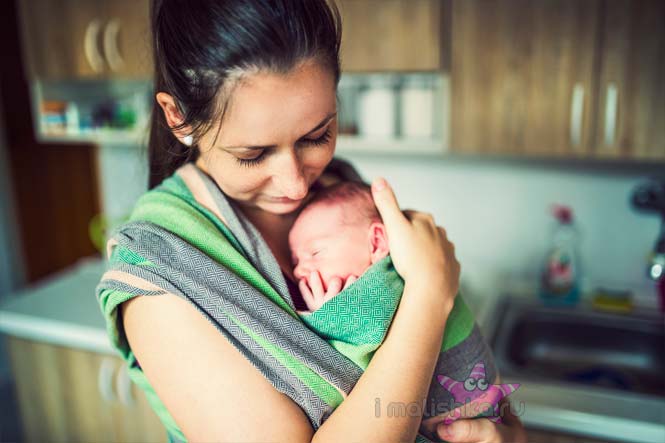
When a child is disturbed by something and he cries, the mother must remain calm. The excitement is transmitted to the newborn and it will be difficult to calm him down. The main thing is to be patient and eliminate the cause of crying: feed, put to bed, hug, change wet clothes. Not every crying newborn speaks of problems, so do not panic.
All children cry. And if it is not difficult to find out and understand the reasons for crying in large children, then it is not so easy to understand why a newborn baby is crying. After all, the usual ways of communication for us are still inaccessible to the baby, and he is also unable to cope with his own, even minor troubles on his own.
The main reasons for crying
The main reasons for the crying of a newborn baby are associated with the most important needs and problems for him: hunger, pain, fear, thirst, discomfort, hypothermia or overheating, overwork, desire to communicate.
At first, it is not easy for parents to understand why their little child is crying. But, communicating with him daily, the mother begins to distinguish between the types of children's crying by intonation, volume and duration.
How to understand the reason
 The most powerful irritants for any person are hunger, pain and fear
. Therefore, we will hear the loudest and most hysterical cry in a newborn in these situations.
The most powerful irritants for any person are hunger, pain and fear
. Therefore, we will hear the loudest and most hysterical cry in a newborn in these situations.
- Crying when hungry will be loud, drawn out, its intensity gradually increases and turns into a choking cry. If the child is just beginning to experience a feeling of hunger, then crying will be invocative. Tip for new mothers: if the baby is hungry, he will begin to look for the breast as soon as he is in your arms.
- Crying in pain , as a rule, plaintive, its intensity does not change, only sometimes notes of despair appear. If the pain arose suddenly, then the crying will immediately be loud and boisterous.
- Crying due to fear , starts suddenly, it is loud, sometimes hysterical. It may stop just as suddenly.
Parents should respond to such crying immediately and not wait until the child calms down on his own. In other cases, the screams will first be invocative, and then, if the baby is still uncomfortable, certain features will appear.
invocative cry - this is an attempt by the crumbs to declare their problems. It is quiet and short, repeated at short intervals. The baby screams for a few seconds and then waits for your reaction. If there is no answer to the “request to come up”, then the crying is repeated, with each repetition the cry will be louder.
Why does a child cry if nothing hurts him and he is not hungry?
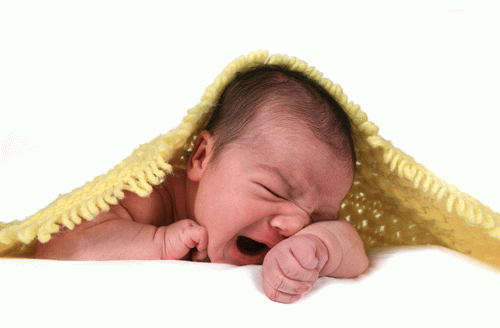
- If the child is uncomfortable with wet diapers, then the crying will be whimpering, and the baby himself will fidget, trying to move from a wet place. If a child has an overflowing diaper, then he will show signs of discontent on his hands.
- If the child is cold, then crying will gradually turn into hiccups with sobs. The baby's skin is pale and cool to the touch.
- If the child is overheated, then crying is accompanied by reddening of the face, the baby makes waves of legs and arms, his skin is hot.
- When overtired, the baby begins to act up, cries at any attempt to entertain him, but calms down when motion sickness.
- If you need to communicate or contact with your mother, the baby cries invitingly and calms down when he hears approaching steps.
Knowing the main causes of crying, it will not be difficult to calm the child. It is enough to eliminate the cause: feed the hungry, rock the sleepy one, change the diaper or clothes if necessary (if the baby is overheated or cold). Difficulties can be delivered by crying because of pain, because it is not always possible to immediately eliminate its cause. But here the main thing is to be patient and behave calmly.
Watch video:
Other situations
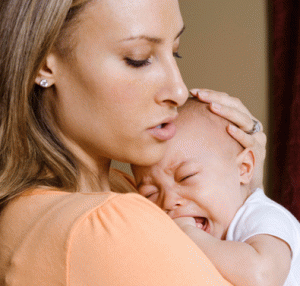
Children sometimes begin to cry when bathing, feeding, and even in their sleep. There are many reasons for such cries.
Baby crying while bathing
- cold or hot water- the temperature of the water before bathing must be checked with an "elbow" or a thermometer, it should be 36-37 degrees C. (Article: child);
- This procedure scares the baby - try to talk about each action in a calm tone while bathing and distract the child, any of your actions should be gentle and smooth (Article: the child is afraid to swim:);
- You behave insecurely, your fear is transmitted to the child - stop being afraid yourself and invite someone to help you bathe;
- There are areas of inflammation on the child’s body (diaper rash, mosquito bites, scratching) - try to prevent the appearance of wounds;
- Add to baby bath water;
Crying while feeding
- During feeding, the baby feels pain. This happens when the mucous membrane of the oral cavity becomes inflamed. (stomatitis,), with infections (inflammation of the throat, ears), with, swallowing a large amount;
- The kid doesn't like the taste. Milk changes with the abuse of strong-smelling foods or foods with a sharp taste (what). Particles of rancid milk may remain on the surface of the nipple, so the breast must be washed before feeding. The product that treats the breast before feeding has an unpleasant taste and smell for the baby. ()
Why does he cry in his sleep
- I wanted to eat;
- I had a terrible dream;
- Lies in an uncomfortable position;
- Experiencing pain;
- I felt that my mother was not around;
More video:
In addition, children sometimes cry when urinating or having a bowel movement. Such cries may indicate inflammatory diseases of the urinary tract or. The reason for this behavior of the child must be clarified together with the pediatrician.
Watch the video:
The cry of a newborn can cause panic and despair in inexperienced mothers. Over time, of course, a woman begins to distinguish the shades of a cry, and after a month she can already say exactly what her baby is “signaling” about. Let's see why the baby may cry and what you can do to calm the baby as soon as possible.
Basic Needs
One of my friends - an experienced mother - once told me: "The baby only needs to be dry, full and mom is nearby." Actually, it is. When a child starts screaming, first of all, look at the clock - when did he eat? Couldn't you be hungry already? In any case, pick up the handles and continue to figure out what's wrong.
If you have determined that the cause of tears is not hunger, check the baby's diaper. Children make it clear when the "diaper" is full and it's time to change it.
Be sure to keep these three simple steps in mind when rushing to the aid of a little sob. It often happens that it seems that she was feeding an hour ago, and the diaper was literally just changed, and the little one comes in. Check again - is it dry? It happens that the diaper slipped, and the baby urinated. And you have to change again.
Oh that belly
After about three weeks, such a misfortune appears in the life of a baby as (they are gaziki). How to understand what they are? For no apparent reason, the child begins to scream and cry loudly, arches strongly and blushes. By the way, sometimes he shows the same behavior when feeding - you know, most likely, his tummy hurts. This can last from 10 minutes to several hours. Colic often happens in the evening or at night.
The fact that drugs for bloating (Espumisan, Infacol, Dill water) should be stocked up in advance, I wrote earlier. But sometimes they don't help 100%. What's left for mom to do? Bend, Raise the baby's legs - such a charge will help the harmful gases to come out. Try putting it on your tummy - on yourself or on the crib. Rock it. Rock it some more. And patience, patience, patience...
Milk misfortunes
I once had a strange situation. The child cried for a long time for no apparent reason. My husband and I decided that it was colic and gave the baby dill water to drink. And we would have remained in the dark even further if the pediatrician whom we decided to call had not asked how many milliliters a child eats in one feeding. How to properly breastfeed intestinal colic. I was sure that the baby was getting enough milk - it seemed to “hang” on the chest for a long time. The next day we rented a scale, and it was then that it turned out that the child was eating a little more than half the norm, and I didn’t have as much milk as I thought. It turns out that all this time the baby was screaming from hunger, so if your baby is exclusively breastfed, and you can’t really understand why the baby is screaming, weigh him often before and after meals.
Sometimes the baby starts crying while suckling the breast. Maybe it's, again, gaziki. As an option - a lack of milk, the child is angry that little food is allocated. Or, on the contrary, there may be too much milk, too strong a flow is unpleasant for the child, he does not have time to swallow and chokes. Express a little or offer a different breast, depending on the situation.
Other troubles
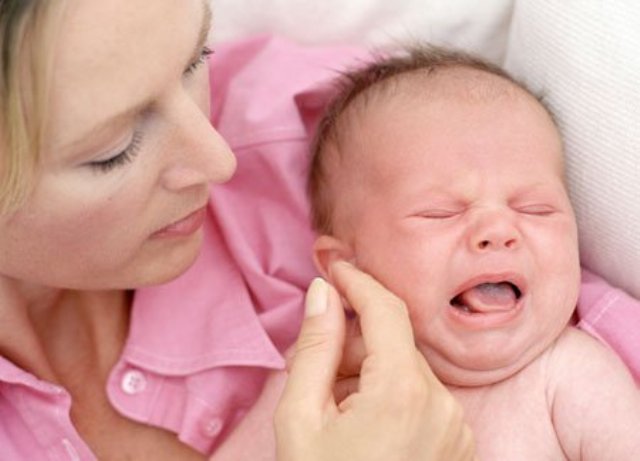
Unfortunately, not a single baby in the world is immune from sores. Therefore, if you have the slightest doubt that your baby is completely healthy, immediately get in touch with your pediatrician. Remember, in a child's body, the disease develops much faster.
However, if everything is fine with your baby, and he just whimpers periodically, do not wind yourself up. Maybe he just communicates in this way or asks to be held by his mother!
In this article:
The most common problem that new parents face is the constant crying of a newborn baby at the age of 1 or 2 months. The child is very small and he still cannot express his feelings and needs for anything in words. Maybe something hurts him? Or does he just want to eat? How to learn to determine why a newborn is crying? Why does a 1-2 month old baby cry in his sleep? How to calm him down, and is it worth it to see a doctor about this?
Reasons for crying
In fact, there are a lot of reasons why newborn babies cry a lot. The most common of them are:
- hunger;
- colic;
- climatic conditions in which the child is located.
Basically, the baby cries because of the hunger he is experiencing. Today, most inexperienced young mothers adhere to a strict feeding schedule, which, as they think, has a beneficial effect on the digestive system. Perhaps they were told about this at and when they were discharged from the hospital. Yes, perhaps it is. But the problem is that the ventricle of a newborn is very small and, accordingly, he eats little. And sometimes he does not have enough of the amount of milk that he consumed during feeding in order to wait for the next “portion”.
Therefore, it is extremely important to feed the child not on time, but on demand. If a newborn baby cries, it is very easy to check whether he wants to eat or not. It is enough to attach a bent little finger to the corner of his mouth. If he starts to turn his head towards the finger and open his mouth as if he wants to grab onto it, then the baby is hungry. It's time to calm him down and attach him to the chest. A child of 1 month of life will eat, quickly fall asleep in his mother's arms, and hunger will not disturb him in his sleep for the next couple of hours.
Colic is the second reason why you cry infant. His digestive system just beginning to master her "new role". As a rule, colic bothers the baby for 1, 2 and 3 months of his life, in some cases they can last up to 6 months. If a baby who is 1 or 2 months old is constantly crying, know that this may be the whole problem.
Determining the crying of a child who is bothered by colic is just as easy. It is impossible to confuse it with any other. The child screams very strongly, jerks its legs and literally chokes from crying. The face becomes red, almost to blue. In this case, to calm crying baby, you need to give the baby a massage and give medicine (today there are a huge number of medications that help relieve the newborn from colic), or give him dill water.
Another reason why a baby cries is the climatic conditions in which it is located. Little babies sometimes cry because they can't stand extreme heat or cold. Each child is individual, so it is necessary to create exactly those climatic conditions under which your baby will feel comfortable.
Determine whether the baby is hot or cold, the following method will help:
- take the child by the hand;
- put your fingers on your wrist;
- if the wrist is cold, then the baby is cold, it needs to be wrapped up more tightly, if it is hot or damp, it is hot, the child needs to be undressed.
Another reason why a baby cries is the negligence of parents who are simply too lazy to change the baby's diaper once again. An adult feels uncomfortable in wet clothes, and a baby whose diaper is full feels discomfort. Check frequently to see if the baby has a bowel movement. If an "accident" occurs, deal with it immediately to reassure your little one. By the way, for the same reason, the child may experience irritation in the inguinal region and in the folds, which can cause the baby not only discomfort, but severe pain and itching. If there is redness in the groin, try to minimize the use of diapers and treat the baby's skin with special creams more often.
Also, the cause of crying can be postpartum complications. Often, young mothers during childbirth cannot direct their forces in the right direction, that is, when they try, they begin to pout, but not there (in the face), due to which the time for the baby to pass through the birth canal has increased. As a rule, at this moment, in most cases, the child develops anemia (lack of oxygen), which negatively affects his nervous system. Because of this, a newborn can sleep poorly, shudder at every rustle in a dream, and constantly scream. In this case, it is necessary to contact a neurologist who will conduct a thorough examination of the baby and prescribe appropriate treatment. After completing a course of medication, nervous system the baby will get better, it will be easier to calm him down and crying will not disturb parents so often.
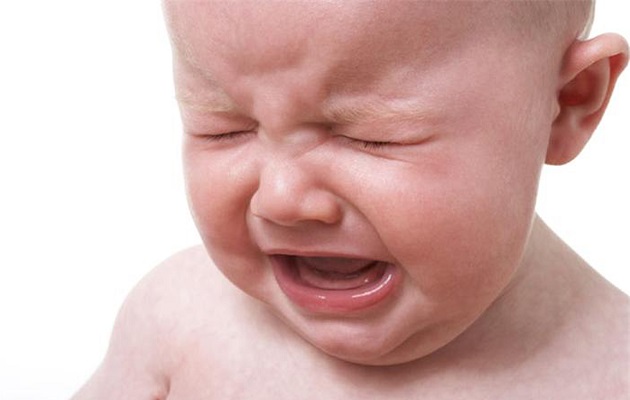
Very often, parents are faced with such a problem when a newborn baby cries with every urination and begins to sound the alarm. In fact, there is nothing terrible here, this is the usual fear of the child of what is happening. He cannot control the process itself, gets scared when he starts to write, as a result of which he starts crying. But still, you need to consult a doctor and take urine tests. Because sometimes there are times when a baby cries because of pain when urinating, which may be associated with:
- with infectious diseases of the urinary system;
- or with an incorrect location of the foreskin.
Pain during urination may also indicate a high concentration of urine, which, passing through the urinary canal, causes irritation and burning.
When a baby cries and has a frequent fever (the norm for a newborn is 37.2 C), you need to urgently go to the doctor. Perhaps the reason lies in an infectious disease that requires urgent treatment.
But our children do not always cry because of hunger or pain. Sometimes they just need the presence of their mother nearby. Before birth, the child was one with her, and now it is very difficult for him to get used to a new life. The baby needs the presence of a mother nearby and feel her warmth and care. Therefore, do not be afraid to spoil the child, take him more often in your arms, apply more often to your chest, put him to sleep in your arms to calm him down, talk to him. This will help the baby calm down and fall asleep quickly. Your care and warmth will definitely return to you in the future!
Why does a newborn cry in his sleep?
If the baby constantly cries in a dream, then it is worth first of all to inspect the baby's sleeping place. Perhaps something is preventing him from sleeping, for example, a sheet is curled under him or he lies on a nipple.
Also, the causes of crying in a dream can be night colic, which prevent the baby from sleeping, teething (in some children, teeth begin to erupt at 3.5 - 4 months), or the banal absence of a mother nearby.
If a child constantly cries in his sleep for 1-2 months, but nothing bothers him, maybe you should think about co-sleeping? The baby will feel calm next to his mother, especially since he can always eat without forcing you to get up if he is breastfeeding.
How to calm a crying baby?
First you need to find out why the baby is crying, and only after that begin to calm him down. If the reason for crying is hunger, feed him, even though it has not even been 2 hours since the last feeding.
If colic is the cause, give the child medicine and massage. And it is done like this:
- put the child on the bed;
- put your hand on his stomach, the palm should completely touch the stomach;
- mentally draw a horseshoe on his stomach, the ends of which are directed downwards;
- with smooth hand movements, follow the path of the horseshoe clockwise.
If this massage did not help your baby, then you can use another massage. However, it can be performed only from 1 month:
- put the child on the bed;
- bend both legs at the knees so that they touch the stomach;
- With smooth movements, take the child's legs first to one side, then to the other. The legs should be tightly pressed to each other and to the stomach.
If these methods do not help, you can use the gas outlet tube. However, you should not abuse it, since the body can get used to the mechanical method of getting rid of gases and then it will be difficult to establish this process.
If a baby who is 1 or 2 months old is crying, and you have already tried everything possible, but nothing helps, it may not be colic. Try putting a heating pad on your baby's tummy, make sure it's not too hot! Give your child dill water or fennel tea.
Carry the child in your arms, press him with your stomach to you. Sometimes both gentle swaying and “dancing” can calm a crying baby. Some children find relief in waltzing movements, others in the style of a march. Try to hold the baby in various positions - vertically, horizontally, belly down. Perhaps you will find exactly the position in which the baby will feel relieved.
But remember that the reason for the crying of a child in a month can be not only in colic or climatic conditions. If the child is restless and cries often, it is best to take him to the doctor. At the appointment with a specialist, you can find out why your baby is crying and make sure that there are no or presence of any diseases.
Useful video about the reasons for crying a newborn
When a baby appears in the house, all relatives surround him with love, care and attention. But at times, the newborn screams heart-rendingly, and the mother cannot always understand the reason for crying.
Crying is different, and parents will eventually learn to distinguish whether the baby needs urgent help, or in this way he is just trying to draw attention to himself. Let's try together to answer the question of why a newborn is crying.
Reasons for crying newborn
An experienced mother will always determine why her baby is crying. Let's describe the characteristic signs of crying of various types:
- Calling cry. The child screams for 2-3 seconds, then calms down for a while, waiting for the result, and then cries again.
- Hungry cry. It begins with an invocative cry, which after a while becomes choking, hysterical.
- Crying with discomfort and pain. This is a continuous and fairly even cry.
- Crying with anxiety, fear, or desire to sleep. A steady whimper accompanied by a yawn and closing of the eyes.
Crying is the most accessible way for a baby to communicate with the outside world. With the help of screaming or crying, the child tells the parents that something is bothering him and he needs help. Let's name the main reasons for crying a newborn:
- physiological discomfort associated with the disease (stomatitis, thrush, colic, otitis media, etc.);
- psychological discomfort caused by a lack of communication with the mother;
- physical discomfort (uncomfortable position, wet diapers, overheating or hypothermia).
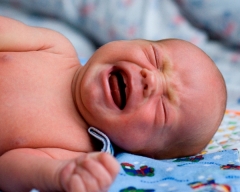 Many babies cry during breastfeeding. Let us consider in detail why a newborn cries when feeding:
Many babies cry during breastfeeding. Let us consider in detail why a newborn cries when feeding:
- I have a stomachache. Colic ‒ frequent occurrence in newborns, which is due to the immaturity of the enzymatic system and intestinal microflora. The child twists his legs and arches, pulling his knees to his stomach.
- The baby swallows air during feeding due to improper grip on the nipple or nipple.
- The child's ears hurt. Swallowing movements with otitis cause acute pain in the ears.
- The newborn does not like the taste of milk. The child takes the breast, throws it and stretches again, but at the same time he cries resentfully and loudly during feeding.
- Lack of mother's milk or its very rapid release.
- The child is tired. The process of sucking is hard work, and the nervous system of the newborn is hyperexcitable. If the baby gets tired, he tells his mother about it by crying.
- Headache. With some neurological disorders, swallowing movements are accompanied by a severe headache. If the baby cries while feeding for no apparent reason, you need to contact a neurologist.
It is clear that we have listed only the most common reasons why a newborn cries. The child may also react negatively to the irritation of the mother or the hostile environment in the family.
First of all, you need to take the baby in your arms, shake and sing a lullaby. Many babies feel more comfortable when swaddled. If the child was crying from boredom, then perhaps he will enjoy a tour of the apartment.
It is likely that the baby is sick, and you need to call a doctor. Before the pediatrician arrives, carry the baby in your arms, apply it to your chest more often, change diapers in a timely manner. In any case, these measures will help improve the condition of the crumbs.
Also, the baby may cry in his sleep. Most parents notice that a baby sleeping peacefully in a crib suddenly starts crying or sobbing. There are a number of important reasons why a newborn cries in his sleep:
- Colic is the most common cause of nighttime crying in young children. The baby simply suffers from excessive gas formation, therefore it often cries even in a dream.
- Mother's absence. Sometimes a newborn cries in his sleep just because his mother is not around.
- Emotional excitement and change of weather.
Experts believe that in the first months of a child's life, the mother should immediately respond to his calls. It is important that a strong bond is formed between the baby and the mother from birth.
Be calm and patient, because as the child grows older, it will be less likely to use crying as a means of communication with parents.
